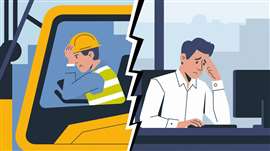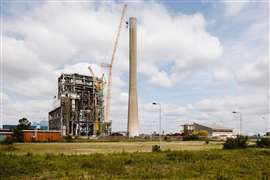Read this article in Français Deutsch Italiano Português Español
Construction stress is not equal – how where you work dictates the stress you feel
28 October 2024
 Image generated via Ideogram 2.0
Image generated via Ideogram 2.0
“It’s not a good idea to get on a 200ft crane when you are having a bad day.”
That’s what a site-based construction worker told a first-of-its-kind study examining stress in the construction industry, conducted by researchers at the University of Cambridge in the UK.
Contrast that with this statement from someone who works for a construction company not on a jobsite but in an office: “If the work all piles up, I get so anxious that I can’t do anything. I just spin.”
It has long been known that the construction sector can be a stressful environment to work in. But what this new study set out to examine was how the stressors that on-site workers and office-based workers experience are different.
Nearly all construction workers are stressed - but differently
What it found was that 70% of on-site workers reported that their work was either moderately, very, or extremely stressful. And they identified specific sources of stress. Frequently, those related to: high workloads, tight deadlines, and safety concerns.
Office workers were no less stressed. In fact, 85% of those surveyed reported finding their job at least moderately stressful. But the sources of stress were different. Office-based workers most frequently cited job complexity and organisational pressures as triggers of stress.
Regardless of the sources of stress, however, both groups said that it affected their work performance, with the added concern of physical health and safety for on-site workers.
The catalyst for the research was the link between workplace and poor mental health in the construction industry, one of the report’s authors, Dr. Olivia Remes, told Construction Briefing.
“Our previous research at the University of Cambridge showed that poor mental health is a real issue. Anxiety, depression and distress are common in construction workers. And if we don’t do something to address poor mental health and stress, then this can have real consequences,” she said.
“We wanted to know what the stress levels are in construction, what is causing that stress, what the implications are for people and how they are coping with it. And what we have done – which no other study has done – is look at site-based and office-based workers,” she added.
Unhealthy coping mechanisms
Meanwhile, a little over half of respondents to the survey reported dealing with the stress they experienced by blocking it out or keeping it to themselves.
“When you are blocking out stress and avoiding difficult emotions, this can lead to feelings of helplessness, which then leads to other negative consequences,” Remes said. “There should be a greater push to tackling the stigma of talking about difficulties you are going through. Self-disclosure is linked to improved resilience in people and it would be interesting to have programmes on that,” she said.
It’s particularly important when you consider that construction is a male-dominated industry and men can sometimes be more prone to bottling up emotions than women, Remes pointed out.
However, workers did report some healthier coping mechanisms too, including using support networks of family and friends, hobbies, and taking time for exercise and meditation.
Developing targeted interventions
The survey included a limited group of 40 participants (33 men and 7 women) from 12 different employers across four major sites in the South East of England.
In spite of the small sample size, Remes said that the findings were potentially applicable in a wider geographical context and she hoped they would lead to further research and ultimately to companies taking the findings on board to develop targeted strategies to reduce workplace stress.
“What this research allows us to do is to develop a more targeted approach to dealing with these stresses. We know that construction is a stressful industry to be in but the stressors acting on different roles are different and you need to be able to identify how they are different and tailor your strategies for dealing with them accordingly,” Remes said.
“We would like to share these findings with construction organisations and highlight the impact these sources of stress are having on workers both in their work and personal life. We also want to scale up this research and repeat the study in other context to develop and refine interventions to tackle stress.”
Read the full report, Work-Related Stress and Coping: A Comparative Analysis of On-Site and Office-Based Workers in UK Building Construction, here.
STAY CONNECTED


Receive the information you need when you need it through our world-leading magazines, newsletters and daily briefings.
CONNECT WITH THE TEAM











